
John James Osborne was an English playwright, screenwriter, actor, and entrepreneur, who is regarded as one of the most influential figures in post-war theatre. Born in London, he briefly worked as a journalist before starting out in theatre as a stage manager and actor. He lived in poverty for several years before his third produced play, Look Back in Anger (1956), brought him national fame.

Joan Ann Plowright, Baroness Olivier, professionally known as Dame Joan Plowright, is an English retired actress whose career spanned over six decades. She has won two Golden Globe Awards and a Tony Award and has been nominated for an Academy Award, an Emmy and two BAFTA Awards. She was the second of only four actresses to have won two Golden Globes in the same year. She won the Laurence Olivier Award for Actress of the Year in a New Play in 1978 for Filumena.
Theatre Workshop is a theatre group whose long-serving director was Joan Littlewood. Many actors of the 1950s and 1960s received their training and first exposure with the company, many of its productions were transferred to theatres in the West End, and some, such as Oh, What a Lovely War! and A Taste of Honey, were made into films.
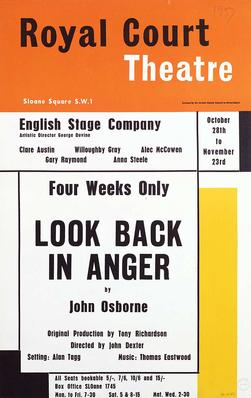
Look Back in Anger (1956) is a realist play written by John Osborne. It focuses on the life and marital struggles of an intelligent and educated but disaffected young man of working-class origin, Jimmy Porter, and his equally competent yet impassive upper-middle-class wife Alison. The supporting characters include Cliff Lewis, an amiable Welsh lodger who attempts to keep the peace; and Helena Charles, Alison's snobbish friend.

Top Girls is a 1982 play by Caryl Churchill. It centres on Marlene, a career-driven woman who is heavily invested in women's success in business. The play examines the roles available to women in old society, and what it means or takes for a woman to succeed. It also dwells heavily on the cost of ambition and the influence of Thatcherite politics on feminism.
In-yer-face theatre is a term used to describe a confrontational style and sensibility of drama that emerged in Great Britain in the 1990s. This term was borrowed by British theatre critic Aleks Sierz as the title of his book, In-Yer-Face Theatre: British Drama Today, first published by Faber and Faber in March 2001.

The Royal Court Theatre, at different times known as the Court Theatre, the New Chelsea Theatre, and the Belgravia Theatre, is a non-commercial West End theatre in Sloane Square, London, England. In 1956 it was acquired by and remains the home of the English Stage Company, which is known for its contributions to contemporary theatre and won the Europe Prize Theatrical Realities in 1999.

Nigel Forbes Dennis was an English writer, critic, playwright and magazine editor.
Philip Ridley is an English storyteller working in a wide range of artistic media.

The Entertainer is a 1960 British kitchen sink drama film directed by Tony Richardson, produced by Harry Saltzman and adapted by John Osborne and Nigel Kneale from Osborne's stage play of the same name. The film stars Laurence Olivier as Archie Rice, a failing third-rate music-hall stage performer who tries to keep his career going even as the music-hall tradition fades into history and his personal life falls apart. Olivier was nominated for an Oscar for Best Actor in a Leading Role.
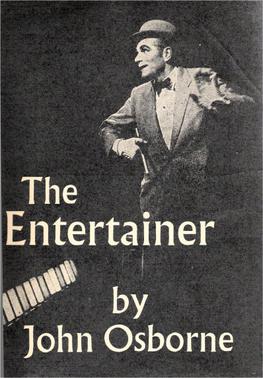
The Entertainer is a three-act play by John Osborne, first produced in 1957. His first play, Look Back in Anger, had attracted mixed notices but a great deal of publicity. Having depicted an "angry young man" in the earlier play, Osborne wrote at Laurence Olivier's request about an angry middle-aged man in The Entertainer. Its main character is Archie Rice, a failing music-hall performer. Years later, Tony Richardson, who directed The Entertainer's premiere season, described Archie as "the embodiment of a national mood ... Archie was the future, the decline, the sourness, the ashes of old glory, where Britain was heading". The first performance was given on 10 April 1957 at the Royal Court Theatre, London. This theatre was well-known for its commitment to new and non-traditional drama, and the inclusion of a West End star such as Olivier in the cast caused much interest.
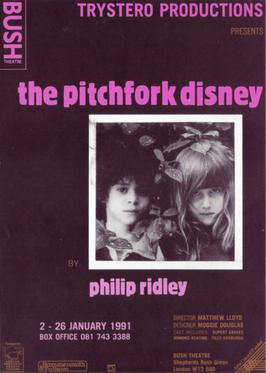
The Pitchfork Disney is a 1991 stage play by Philip Ridley. It was his first professional stage work, having also produced work as a visual artist, novelist, filmmaker, and scriptwriter for film and radio. The play premiered at the Bush Theatre in London, UK in 1991 and was directed by Matthew Lloyd, who directed most of Ridley's subsequent early plays.
George Alexander Cassady Devine was an English theatrical manager, director, teacher, and actor based in London from the early 1930s until his death. He also worked in TV and film.
Ghost from a Perfect Place is a two act play by Philip Ridley. It was Ridley's third stage play and premiered at the Hampstead Theatre, London on 7 April 1994. The part of Travis Flood was played by the veteran, classical actor John Wood, for which he received general acclaim and was nominated for 'Best Actor' at the 1994 Evening Standard Drama Awards. The production was the third collaboration between Ridley and director Matthew Lloyd, who had directed all of Ridley's previous stage plays and would go on to direct Ridley's next play for adults Vincent River in 2000.

Martin Andrew Crimp is a British playwright.
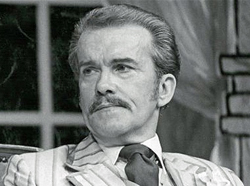
Albert John Moffatt was an English character actor and playwright, known for his portrayal of Hercule Poirot on BBC Radio in twenty-five productions and for a wide range of stage roles in the West End from the 1950s to the 1980s.
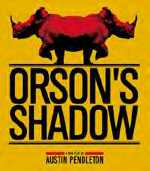
Orson's Shadow is a play by Austin Pendleton. The play received a Lucille Lortel Award nomination for Outstanding Play and won the Drama League Award for Distinguished Performance.
Anthony Neilson is a Scottish playwright and director. He is known for his collaborative way of writing and workshopping his plays. Much of his work is characterised by the exploration of sex and violence.
Aleks Sierz is a British theatre critic. He is known for popularising the term "In-yer-face theatre", which was the title of a book he published in 2001.

The Fastest Clock in the Universe is a two act play by Philip Ridley. It was Ridley's second stage play and premiered at the Hampstead Theatre, London on 14 May 1992 and featured Jude Law in his first paid theatre role, playing the part of Foxtrot Darling. The production was the second collaboration between Ridley and director Matthew Lloyd, who would go on to direct the original productions for the majority of Ridley's plays until the year 2001.












